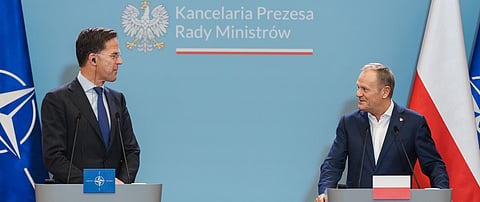

NATO Secretary-General Mark Rutte issued a stark warning on Wednesday, declaring that the alliance’s retaliation against any Russian attack on Poland or other member states would be "devastating."
Speaking during a one-day visit to Warsaw, Rutte urged European nations to bolster their defense capabilities amid growing concerns over U.S. commitment to transatlantic security. His remarks come as NATO seeks to reinforce unity within the 32-member alliance, particularly after U.S. President Donald Trump questioned Washington’s unconditional defense guarantees.
"No Room for Miscalculation"
"If anyone were to miscalculate, thinking they could attack Poland or any other ally without consequences, our response will be forceful—and devastating," Rutte said at a joint press conference with Polish Prime Minister Donald Tusk.
"This must be clear to Mr. Vladimir Vladimirovich Putin and anyone who would consider attacking us," he added.
Rutte’s warning follows heightened tensions within NATO, as European members face pressure to increase defense spending while the U.S. shifts its strategic focus toward Asia and domestic priorities. The NATO chief stressed that global security challenges demand collective action rather than unilateral approaches.
“This is not the time to go it alone—not for Europe, nor for North America,” Rutte said in a speech in Warsaw. “The threats we face are too great for any one nation to handle independently.”
Poland Praised as Key Ally
Rutte commended Poland for its substantial contributions to NATO’s joint budget and its commitment to regional security. Warsaw currently allocates over 4% of its GDP to defense, with plans to increase spending to 5% in 2025—far exceeding the alliance’s 2% benchmark.
Prime Minister Tusk, in turn, thanked Rutte for NATO’s support of Shield East, a Polish-led initiative (2024-2028) designed to fortify the country’s defenses against potential military and hybrid threats from Russia.
“Poland bears full responsibility for the security of its eastern border, as well as that of our European and NATO allies,” Tusk said. “We have a unique geography, a difficult history, and an unmatched determination to invest in our defense.”
Transatlantic Reassurance Needed
Rutte acknowledged concerns over wavering U.S. support for NATO’s Article 5 principle—that an attack on one ally is an attack on all—but expressed confidence in America’s enduring commitment.
“Europe must know that Uncle Sam still has our back, but America must also see that its allies are stepping up,” Rutte said. “Reassurance is a two-way street.”
He emphasized that while Europe must strengthen its defense industry, nothing can replace the U.S. nuclear umbrella as the ultimate security guarantee.
When asked about Trump’s recent ambiguous remarks on defending NATO allies, Rutte remained optimistic, stating that the alliance would enter a “new chapter” at its June summit in the Netherlands, with higher defense spending targets—potentially exceeding 3% of GDP.
“We will build a stronger, fairer, and more lethal NATO,” Rutte said, “because the world is only growing more dangerous.”